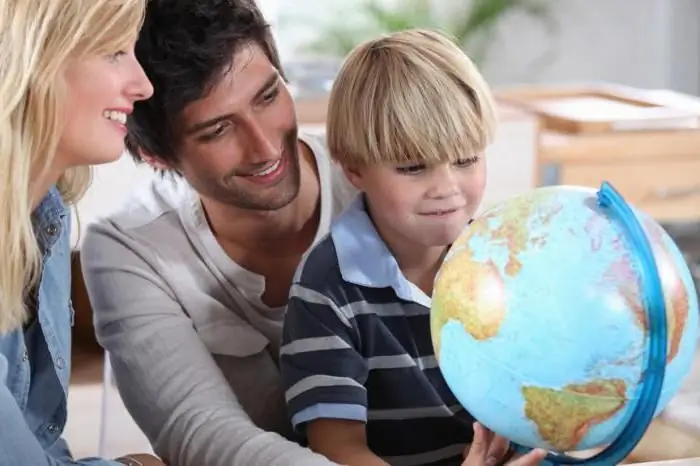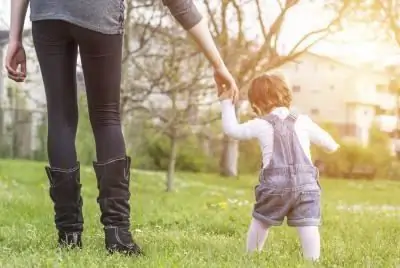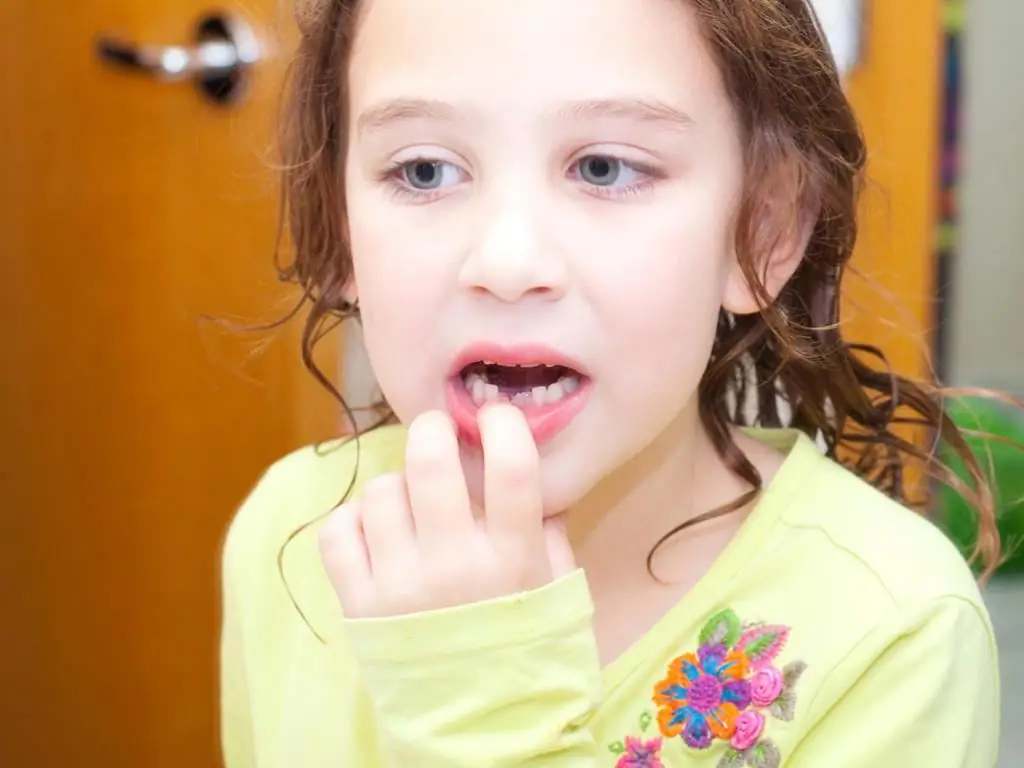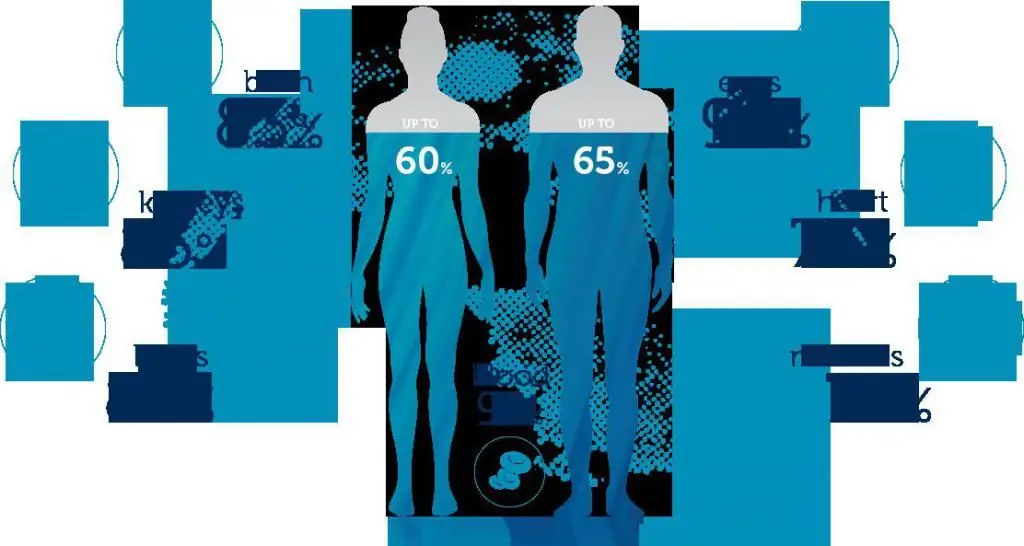2026 Author: Priscilla Miln | miln@babymagazinclub.com. Last modified: 2025-01-22 17:55:16
Many parents who have registered their child in kindergarten are in joyful expectation. Now they can safely go to work, deal with the accumulated cases. However, on the first day they face a big problem. For some reason, the child does not want to go to the group, rests, cries. The parents are completely confused. They begin to get nervous, think that something has happened, they are probably being offended, a bad teacher has been caught, angry children who are fighting or taking away toys. Mothers of toddlers are especially worried, because children cannot tell everything in detail.
Let's figure out together what happens during this period of a child's life, when it ends, is it worth worrying and taking him home.
In the article, parents will receive answers to all their questions, and also understand what the child's adaptation in kindergarten is, how long it lasts, how to help the baby cope with this difficult period of his life. Let us say in advance thatDon't worry, all kids go through this. First, let's understand what the onboarding process is.
What is adaptation?
Adaptation is an adaptation to a new life, to changing external conditions. Remember your feelings when you first come to a new job, meet with a team of employees, superiors. Even in an adult, there is excitement at first. Some adapt quickly, while others find it more difficult. What can we say about the baby, who was torn out of his usual habitat, from well-known, close people, and taken to a strange room, to an unfamiliar teacher. Do not forget that there are usually a lot of children in kindergarten, and such a large number of peers can scare a baby who is not used to noisy games.

Changes are also taking place in nutrition, treatment, adult demands, and the need to establish relationships with peers.
As a result of violation of the established rules of behavior, formed habits, the child has negative reactions. Adaptation of a child in kindergarten may be accompanied by discontent, crying, tantrums, irritability, during this period there may be sleep disturbances, in especially severe cases, even an increase in body temperature, a violation of the intestines. Consider the main causes of tears during adaptation.
Reasons for anxious child behavior
- Adaptation to kindergarten of 2-3-year-old children is associated with the anxiety of the absence of a mother. After allkids are in dire need of constant care of a loved one, increased attention, not everyone can ask for help from a stranger, even a benevolent adult.
- Many children have a hard time getting used to discipline and strict observance of regime moments. After all, at home, the child still has a lot of freedom. The baby's personal regime is violated, and this causes dissatisfaction.
- New impressions, a large number of children cause excessive emotions, accompanied by sleep disturbance, increased excitability of the nervous system.
- Harder for home children and in terms of self-care. This greatly complicates the life of a child who is not used to eating, dressing, folding toys, doing things with his hands.
- The process of adapting children to kindergarten conditions can be complicated by the first negative impression. For example, a child's favorite toy was taken away from him or the one he liked was not allowed to play.
- There was a misunderstanding with the adults around him. Rarely, but it happens when the caregiver does not find contact with the child or the baby himself flatly refuses to communicate with a stranger.
Difference in behavior during adaptation
All children are different and it is impossible to predict in advance the behavior of a child in a given situation. There are sociable children, among the people they are called "gypsy child". They calmly make contact with strangers, love the company of other children, quickly get to know each other, try to please, love praise.

However, there is another option. When the baby spent at hometime, mostly with my mother, did not even want to stay for a couple of hours with my grandmother. The rest of the children were shy, from the questions of strangers he hid behind his mother.
It is clear that such children will perceive the kindergarten negatively, and the adjustment period will take a long time. Psychologists distinguish several forms of a child's adaptation to kindergarten.
Easy adaptation
The first group includes children who, although not always willingly, go to kindergarten. Parents may observe slight changes in behavior. The process of adaptation of the child in kindergarten takes place without frequent illnesses. This behavior is typical for most kids, especially the younger group. Initially, children run with pleasure to play with other children, examine new toys, children's bright furniture. Some still have a hard time saying goodbye to their parents in the morning, but then they quickly calm down and play with the children. The period of complete adaptation to new conditions occurs within the first month. The body of the child does not experience serious stress and the immune system copes. Such babies are not prone to tantrums, sometimes there are slight whimpers, short-term whims, for example, demands are made in the morning - I want to take a steam locomotive, my mother's phone or go in a smart dress.
Medium adjustment
The second group of babies is characterized by a longer habituation to unusual conditions. Psychologists note minor nervous states, without tantrums. Adaptation of a child in kindergarten in the nursery group is accompanied by frequent morbidity. This is the so-called viralbacterial adaptation. Behavior in the morning depends on the mood of the child. Sometimes she is sad and parted with her mother for a long time, there are days when she enters the group without crying, calmly.

But the main difference from a mild degree lies in hidden experiences when the baby feels stress inside. At night, he can wake up in tears, spin, talk in his sleep. Immunity is reduced, and the child begins to get sick often. However, being at home, recovery comes quickly, diseases are not accompanied by complications. The process of adaptation of children in the nursery group of the kindergarten lasts up to two months. Then the child gets used to new children, to educators, finds a friend, takes an active part in games.
Severe cases
These are quite rare cases that occur in a single copy in each group of kindergarten. The child does not want to contact a stranger at all, it is impossible to lure him with anything - neither a beautiful toy, nor a hamster in a living corner. The morning begins with hysteria, on the way all the neighbors hear that the child is being taken to kindergarten. Staying in the group, the baby cries for a long time, sits apart, hides in a corner so that no one bothers him, does not want to eat or play. If the educator tries to talk to him or involve him in activities, he perceives everything negatively, and immediately begins to cry. It’s good if you come across an experienced teacher who can quickly find a common language with such a difficult child. He needs to be given special attention, hold him in his arms, stand next to him on a walk. Then the baby will feel a sense of security and will get used to the caregiver much faster. During this period, you need to consult a doctor about improving immunity, for example, take a complex of vitamins. This will help to avoid frequent illnesses and adaptation will be faster.
Advice to parents
The adaptation of the child in kindergarten will be much more successful if the parents do the preparatory work. Be sure to tell the baby in advance what it is, why parents bring their children to kindergarten, where loved ones are at that time. Many children, even those who happily go to the garden in the morning, anxiously ask their mother: “Will you come for me?” The fear remains that the child was left and will not come. Be sure to repeat over and over again that you love him and will come soon. In the evenings, you can come to the territory of the kindergarten and show the baby the evening departure of the children home. Late in the evening, walking nearby, pay attention to the child, how empty the territory of the institution is, there is no one else, all the children have gone home.

Empty talk that there are many children and toys will not calm the child at all. He needs to truthfully explain the situation that adults need to go to work, earn money, and they are afraid to leave a small child alone in an apartment. Therefore, they came up with a special place where children are under the supervision of adults. In the evenings, the kindergarten is closed, and the parents take everyone home. The adaptation of the child in kindergarten will be calmer if the parents bring the baby to the group in advance, introduceteacher, you can come up during an evening walk and play for several evenings with children in the presence of parents. Then the child will not be so scared on his first working day, since he has already seen many children, the teacher knows.
Parental Mistakes
Some mothers are completely unprepared for the first day of visiting the kindergarten, they are very surprised that their child behaves like this, for some reason suddenly cries, does not want to play with children. Their anxiety is passed on to the child. The adaptation of the child in kindergarten will be easier if the parents do the preparatory work and, most importantly, they themselves are ready for the possible reaction of the baby. If you are very worried about how the child behaves without you, then it is best to use a mobile connection and ask the teacher personally about this.

The next mistake of parents is the fact that they do not take into account the adaptation of the child in kindergarten. Advice for parents can be given as follows: do not immediately plan to get a job or start important business. It takes several months for the child to get used to the new conditions of life. At first, it will need to be picked up early, and at the beginning of the visit, the kids will get sick.
Another mistake is to discuss in the presence of the family of caregivers, expressing concern that the child cries in the morning, and you can not scold the child for his tears. This will only make the problem worse.
How to respond to a child's behavior?
If the parents did not prepare the baby in advance, but immediately sent them to kindergarten, then the following tips will come in handy on how to helpchild in adaptation in kindergarten. First you need to hug and soothe a crying child. You can promise that he will play a little while mom goes to the store and buys something tasty. Be sure to give your little one a toy he loves to play with.

Never deceive a child, do not give empty promises, for example, you go, wash your hands, and I'll wait for you in the locker room. The kid will definitely run to check if mom is there, and will be very disappointed. Again, such a maneuver will not work, you will lose the trust of the child.
In no case do not get upset yourself, no matter how worried you are, it is impossible for the excitement to be transmitted to the child. Mom should smile and be outwardly absolutely calm.
Adaptation to kindergarten children at 3-4 years old
At this age, children go through a difficult period of getting used to new conditions much easier. Firstly, kids of this age are already looking for communication with peers, they want to be in a children's team. Secondly, the skills of independent activity are more developed than those of two-year-olds. The child already calmly dresses himself, eats, visits the toilet, washes his hands. The speech of three-year-old children is sufficiently developed to tell their mother in detail in the evening what happened during the day, with whom he made friends, what classes the teacher conducted.
Advice to parents
In order for the child's adaptation in kindergarten to go smoothly and quickly, you need to follow the recommendations of educators and psychologists. First of all, you need to do a lot of preparatory work. The child must beindependent. Review the daily routine, and bring it as close as possible to the daily routine in the garden. The same applies to nutrition. Do not use snacks and sandwiches, accustom the child to the kindergarten diet - soups, cereals, vegetables. Garden children must sleep during the day, because their life is filled to the limit, they get tired both mentally and physically. It is advisable to teach the child to daytime rest at home.

Give your baby only those toys that he can share with his comrades. Keep especially valuable pieces at home so that there are no tears in case of breakage.
Conclusion
The article provides the necessary advice that will help young parents facilitate their child's adaptation in kindergarten. If the mother is familiar with the psychological characteristics of this period, she will be able to behave correctly and her calmness will be transferred to the baby.
Recommended:
Plan of work in the preparatory group with parents. Reminder for parents. Advice for parents in the preparatory group

Many parents believe that only teachers are responsible for the education and upbringing of a preschooler. In fact, only the interaction of preschool workers with their families can give positive results
Hyperactive child: what should parents do? Psychologist's advice and recommendations for parents of hyperactive children

When a hyperactive child appears in a family, he can become a real nightmare for parents, and only by listening to the advice of a psychologist, you can help him adapt and calm down a little cool temper
Change of milk teeth in a child: terms, age limits, procedure for changing teeth, features of the process and advice from parents and doctors

As a rule, children's teeth fall out at a certain age. However, sometimes they are replaced earlier or later than the due date. Let's see what it could be. It is also worth studying the useful recommendations of experts
How to teach a child to drink water: maintaining the water balance in the child's body, advice from experienced parents and recommendations from doctors

Physiologists in their studies have proven that the human body is 70-90% water, and its lack is fraught with dehydration, which leads not only to diseases, but also to malfunctions of organs. How to teach a child to drink water if he does not want to? First, be disciplined and lead by example. As the saying goes, it takes 21 days to form a habit. Make a rough schedule and drink water together. You can add an element of the game by inviting the child to drink water at speed, who is faster
The child is crying in the kindergarten: what to do? Komarovsky: adaptation of the child in kindergarten. Psychologist's advice

Almost all parents are familiar with the situation when a child cries in kindergarten. What to do, Komarovsky E.O. - children's doctor, author of popular books and TV shows about children's he alth - explains in great detail and is accessible to every parent. Why the baby cries and how to avoid it, we will tell in our article

